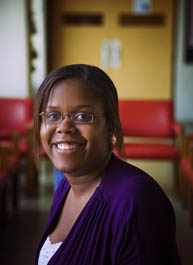Ava-Ann Allman: Brain researcher leads with her heart
Ava-Ann Allman: Brain researcher leads with her heart McGill University
User Tools (skip):
PROFILE
Ava-Ann Allman: Brain researcher leads with her heart

Ava-Ann Allman was one of only three Canadians nominated by NSERC to attend the annual Lindau Meetings.
For Ava-Ann Allman, the news that she'd be chosen to spend a week at the exclusive Lindau Meetings was something akin to a baseball nut being picked for a fantasy camp with the 1927 New York Yankees. During the summer, the PhD candidate and a group of fellow students from around the world spent a week hobnobbing with 18 Nobel Prize Laureates in Lindau, Germany.
"The Laureates are just so… normal," Allman said when asked what lesson she came away with. "You have these big ideas in your head of what they're going to be like, but it's really heartening to see that they are just people who love what they do."
Allman's attraction to the human side of things permeates just about everything she does. For starters, Allman works almost entirely with people in her research—a significant difference from virtually all the Nobel Laureates gathered at Lindau, who mostly conduct research on animals and single-cell organisms.
Currently, the native of Kingston, Jamaica is preoccupied with dopamine, a chemical associated with higher-order cognitive functions—such as memory and inhibition—that allows people to get through their day-to-day lives.
In particular, she is concerned with the role dopamine plays in people with schizophrenia and attention-deficit/hyperactivity disorder (ADHA) and their relatives. As such, Allman is witness to significantly more human drama than researchers working with lab rats.
Allman has never shied away from the tough stuff, having worked at various times with cancer patients, people suffering from dementia and children with fetal alcohol syndrome. While she admits the stories she hears are both harrowing and rife with tragedy, she has a knack for finding the shaft of light piercing the darkness. "Sometimes it's really hard to see what people have to deal with and the stories family members tell are shocking," she says. "But people are so resilient and strong. They all have their moments when they say, ‘I'm not going to make it,' but most of them do make it. Cancer patients who say, "I'm going to beat this' and people with dementia who say the most incredible things in moments of lucidity—it really is inspiring."
While she plans to continue her research, there is something in Allman that won't allow her to be sequestered away in a lab for the rest of her life. "I definitely want to teach as well," she says, having been bitten by the bug as a teaching assistant.
She also tours local area elementary and high schools during Brain Awareness Week, teaching kids about the innermost workings of their heads. "We have a real brain that they can touch," she laughs. "Even the high school students are enthusiastic about that."
When not working with people for the benefit of people or teaching people, Allman likes to unwind by, you guessed it, socializing. She takes dance classes, hangs out with friends and is frustrated with her French course because she feels ill-prepared to dive into conversations—no doubt a living hell for someone as gregarious as Allman.
It is fitting that one of her favourite presentations in Lindau was given by Professor Ferid Murad, who was a co-winner of the Nobel Prize for Medicine in 1998. "He told us, ‘I wasn't very good in school—let's be honest, I was awful. But once I found what I loved, I sat down and did it as best I could.' "
One can't help but think Allman found what she loved the very first moment she laid eyes on another person.

